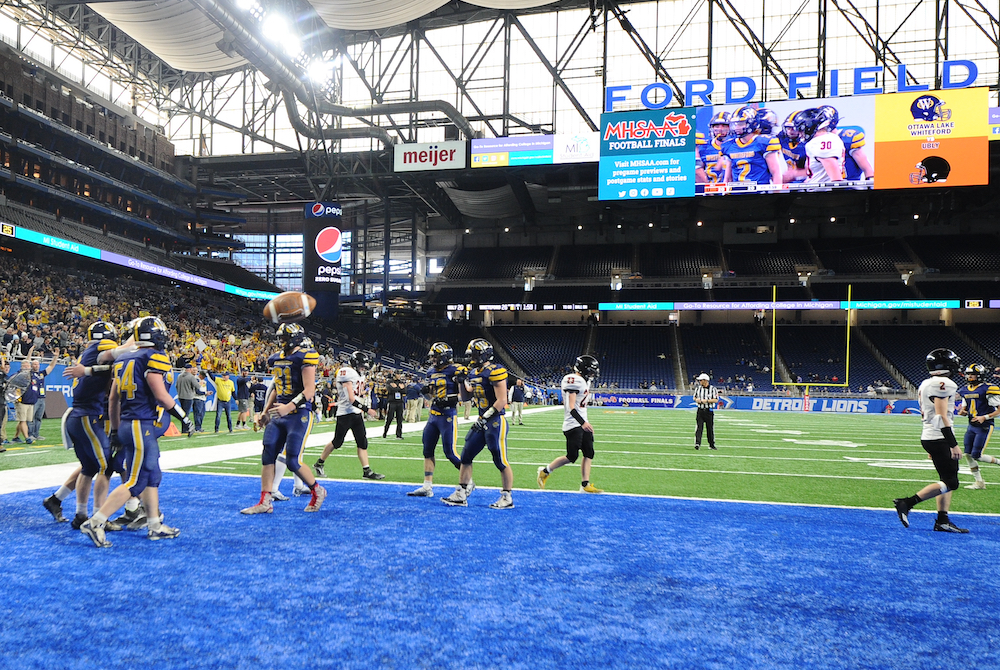
Making Matters Worse
March 17, 2017
For many years there have been complaints that the MHSAA Football Playoffs make it difficult for some teams to schedule regular season football games. Teams that are too good are avoided because opponents fear losses, and teams that are too small are avoided by larger schools because they do not generate enough playoff point value for wins.
Recently the MHSAA has learned, only indirectly, that some among the state’s football coaches association are recycling an old plan that would make matters worse. It’s called the “Enhanced Strength of Schedule Playoff System.”
Among its features is doubling the number of different point value classifications from four (80 for Class A down to 32 for Class D) to eight (88 for Division 1 down to 32 for Division 8).
What this does is make the art of scheduling regular season games even more difficult; for the greater variety of values you assign to schools, the more difficult it is to align with like-sized schools.
The “Enhanced Strength of Schedule Playoff System” makes matters even worse by creating eight different multipliers depending on the size of opposing schools. Imagine having to consider all this when building a regular season football schedule.
When this proposal was discussed previously statewide in 2012, it was revealed that it would have caused 15 teams with six regular season wins to miss the playoffs that year, while two teams with losing records would have qualified. How do you explain that to people? It was also demonstrated in 2012 that larger schools in more isolated areas would have to travel far and wide across the state, week after week, to build a schedule with potential point value to match similar sized schools located in more heavily populated parts of our state and have many scheduling options nearby. How is that fair?
The proposal is seriously flawed, and by circumventing the MHSAA Football Committee, its proponents assure it is fatally flawed.

Set, Ready, Challenge: 11-Player Football Finals Challenges New in 2022
By
Jon Ross
MHSAA Director of Broadcast Properties
November 25, 2022
New this year at the MHSAA 11-Player Football Finals is the opportunity for head coaches to challenge a call.
In previous years, all potential scoring plays and potential turnovers were automatically reviewed. That process will continue and now, under a limited set of circumstances, the head coach can challenge calls.
To do so, the head coach must first call a timeout. If a team has no timeouts remaining, they are not able to challenge a call. Challenges must be presented to the officials immediately after the timeout is granted. If the challenge is successful, the team will get its timeout back and have the ability to challenge one more call during regulation. A second successful challenge will not result in the ability to challenge a third call.
The following plays are reviewable by challenge:
- Complete/incomplete passes
- Runner/receiver in/out of bounds
- Runner ruled not down
- Forward progress spot as it relates to the yard to gain
- First touching of a kick
- Recovery of a ball in/out of bounds
- Forward/backward pass
- Penalties called on the field only for:
- Illegal forward pass
- Targeting or illegal helmet contact
- Pass interference only as it relates to the pass being previously tipped
NOTE: All other penalties called on the field are not reviewable. These include, but are not limited to: illegal formation, ineligible receivers downfield, illegal participation, illegal substitution or delay of game. If a penalty is not called by the officials on the field, the play can never be reviewed to retroactively call a penalty.
In overtime, challenges – like timeouts – reset. Each team has the ability to challenge one call for the entirety of overtime, but must have a timeout to use to do so. A successful challenge in overtime will not result in the ability to challenge a second call.
If a play is overturned in regulation or overtime, the replay officials will correct all aspects of the play including time, position of the ball and whether the clock will be started on the RFP or snap. The game clock or play clock may be reviewed only as it directly relates to the overturning of a call on the field.
There is no change to the review of potential scoring and potential turnover plays. Those plays are automatically looked at by the replay official and replay assistant. If the replay official can confirm the ruling on the field without stopping play, the official will do so. If more time is needed to review the play, the on-field referee will announce that and then will announce the replay official’s decision. For a play to be reversed, there must be indisputable video evidence that shows the original call was incorrect. Every attempt will be made to complete the review process in 90 seconds or less.
The addition of the coach’s challenge was approved by the MHSAA’s Representative Council at its May 2022 meeting.

